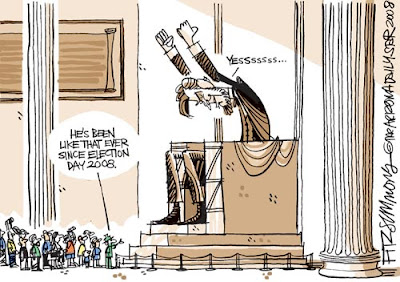(Editors note: This is the fourth and
final segment in a four part series under title of The Search for Truth in a
Reverent Spirit. The underlying series theme
features the clash between reason and matters of the spirit which defy rigid
limitations of scientific calculation, as best told through the political transformation
of Theodore Roosevelt.)
What is the mystery food that distinguishes the unselfish citizen from the mere
hoarder of gold?
Special Message to Congress, intellectual plaudit and lofty speech on New Nationalism aside, the heart
of Theodore Roosevelt’s political transformation occurs in December 1910, when he chooses to
publish an extraordinary essay, The
Search for Truth in a Reverent Spirit.
It is, for him, almost a religious confession.
To measure the progress of social advances and the elusive search for
truth, rigid materialistic standards in science that reject the imaginative or
metaphysical are simply too regressive.
Reason, as in evolutionary science, and the accompanying blunt physical
force of materialistic pursuits, is alone insufficient.
T.R. has seen that rigid theories, or dogmas, no matter how provable they
seemed in the marketplace at a given time, are typically swept away by the
currents of historical change. In other
words, today’s “law” might be tomorrow’s superstition, and vice versa.
Important factors such as, for example, the human emotion of love, and
common sense, are not sufficiently accounted for. Similarly, there can be no advancement of
knowledge absent the part of wisdom to accept the teachings of experience, and
practice humility in the process. For
the first essential requires the willingness of men to say ‘We do not know.”
Moreover, where experience has plainly proven that the intellect has
reasoned incorrectly, true wisdom requires that the teachings of experience be
accepted. In such case reason must be
humbled --- just under like conditions experience would require theology to be
humble.
T.R. feels that any steady scientific or social
advance has to give way to “bolder, more self-reliant spirits … men whose
unfettered freedom of soul and intellect yields complete fealty only to the
great cause of truth, and will not be hindered by any outside control on the
search to attain it.”
He is saying that wider recognition must be given to faith, the spiritual
qualities inherent in “the narrowness of a shut-in materialism.” This permits the opening up of a new theory
that the principle of group development in human beings is as instinctive and
organic as that in biological evolution.
The embrace of both faith and reason is necessary for a person of
“conscience” in searching for truth, as something entirely practical, yet
divine.
Faith and reason are seen as coefficients, not opposites, in the quest for
progress. Superior wisdom understands
“that outside the purely physical lies the psychic, and that the realm of
religion stands outside even the purely psychic.”
Those who profess faith while allowing materialism to persuade them are not
having philosophy both ways. On the
contrary, they are “in a position of impregnable strength,” rightly holding
that religion itself is evolutionary and has to adapt as it progresses.
To them Christianity, the greatest of the religious creations which
humanity has seen, rests upon what Christ himself
teaches: for, … the performance of duty is faith in action, faith in its highest
expression, for duty gives no other reason, and need give no other reason, for
its existence than ‘its own incorruptible disinterestedness.’
T.R. sums
up his argument concerning duty and the notion of an ethical obligation:
Surely we must all recognize
the search for truth as an imperative duty; and we ought all of us likewise to
recognize that this search for truth should be carried on not only fearlessly,
but also with reverence, with humility of spirit, and with full recognition of
our own limitations both of the mind and the soul. … To
those who deny the ethical obligation implied in such a faith we who
acknowledge the obligation are aliens; and we are brothers to all those who do
acknowledge it, whatever their creed or system of philosophy.
All the books he has consulted concern progress from one state of held beliefs to another over the course of history. All try in vain to deny, and have accepted, that faith (belief) is as transformative a force as reason (materialism), as well as a necessary catalyst. After a lifetime of rejecting spiritual speculation, in favor of the body electric and the physics of (military) power, T.R. concedes the vitality of faith --- not necessarily Bible-thumping, but at least the compulsive “ethical obligation” that distinguishes the unselfish citizen from the mere hoarder of gold.
 If nothing else, T.R. is now
sure that whatever he does with the rest of his life will have to have moral
purpose. His efforts will reach an apex with the captivating presidential election of 1912, in which T.R. challenges the democratic process to higher ideals. With the 2016 election looming, this will be the subject of upcoming articles.
If nothing else, T.R. is now
sure that whatever he does with the rest of his life will have to have moral
purpose. His efforts will reach an apex with the captivating presidential election of 1912, in which T.R. challenges the democratic process to higher ideals. With the 2016 election looming, this will be the subject of upcoming articles.
-Michael
D’Angelo